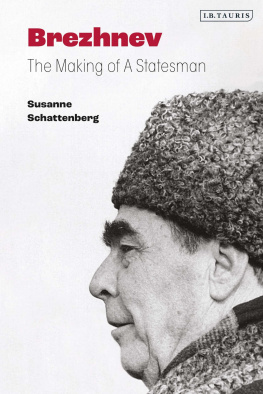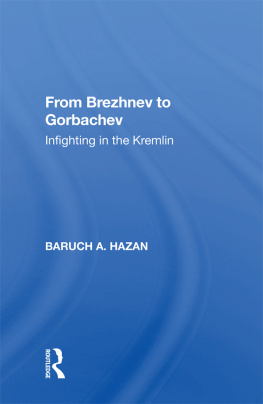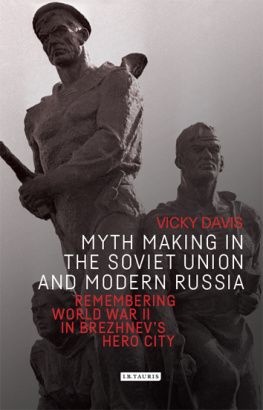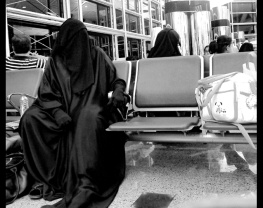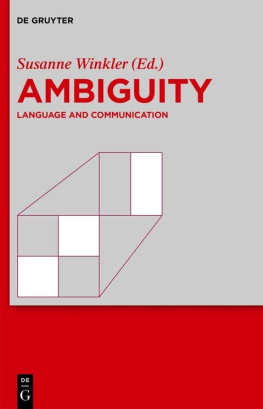Illustrations
Self-portrait of Brezhnev during the war, taken with a German Rolleiflex camera. Credit: Vladimir Musaelyan
Leonid Brezhnev with siblings Vera and Yakov as members of an amateur dramatics troupe in Kursk, 1924. Credit: Vladimir Musaelyan
Brezhnev family photograph: the mother standing, the father sitting with Brezhnevs siblings Yakov and Vera, Leonid standing on the right in his grammar school uniform, 1915. Credit: Vladimir Musaelyan
Brezhnev, centre, fifth from the left in the light shirt, as a student at the college in Kursk, wearing a students uniform and cap, 1927. Credit: Vladimir Musaelyan
Brezhnev, sitting, first left, as a freshly graduated engineer in the company of his fellow students in Kamenskoye, 1935. Credit: Muzey Istorii Mista Kamyanske
Viktoriya and Leonid Brezhnev as a married couple in Kamenskoye, 1935. Credit: Vladimir Musaelyan
Brezhnev during the war, with his favourite horse, Donchak. Credit: Vladimir Musaelyan
Brezhnev (r.) talking with Nikita Khrushchev (l.), 1 June 1942. Credit: Credit: Rossijskiy Gosudarstvennyy Arkhiv Kinofotodokumentov GAKFD 1-81597
Brigade Commissar Brezhnev, in the foreground, seated, addresses the troops, 1942. Credit: Vladimir Musaelyan
Major General Brezhnev (centre) at the Red Square victory parade under the banner of the Fourth Ukrainian Front, left General Colonel Kirill Moskalenko, right General Lieutenant Andrey Bondarv, 24 June 1945. Credit: Vladimir Musaelyan
Brezhnev and his wartime love Tamara Levchenko, 1943. Credit: Vladimir Musaelyan
Brezhnev (first right) at a ceremony marking the re-firing of the first blast furnace at Zaporozhstal steelworks in Zaporozhye, 30 June 1947. Credit: Vladimir Musaelyan
Brezhnev (second right) with a government commission at Zaporozhstal, 1947. Credit: Vladimir Musaelyan
Brezhnev, 1945. Credit: Vladimir Musaelyan
Brezhnev as deputy party leader of Kazakhstan with a farmer on the Taman Division sovkhoz in Bulayevskiy uyezd, Kazakhstan, 1954. Credit: Tsentralnyy Gosudarstvennyy Arkhiv Kinofotodokumentov i Zvukozapisey Kazakhstana, photo no. 2-71805
Honours ceremony to mark the successful space mission by Yuriy Gagarin; from left to right: Brezhnev, Academy President Mstislav Keldysh, Nikita Khrushchev and Second Party Secretary Frol Kozlov, Moscow, 19 June 1961. Credit: Vladimir Musaelyan
Brezhnev presents Culture Minister Ekaterina Furtseva with a medal, 17 December 1960. Credit: GARF, f. R-7523, op. 78, d. 37b, l. 45
Brezhnev pins a medal to the lapel of the head of the Georgian party, Vasiliy Mzhavanadze; between them is Mikhail Georgadze, 22 September 1962. Credit: GARF, f. R-7523, op. 78, d. 37v, l. 8
Brezhnev, second left, surrounded by his aides at the Zavidovo hunting lodge, 1970. Credit: Fond Gorbacheva, photo no. Bo013
Brezhnev on the phone while on holiday in Crimea, 1982. Credit: Vladimir Musaelyan
Brezhnev with a stag at the Zavidovo hunting lodge, 1977. Credit: Vladimir Musaelyan
Standing, left to right: Brezhnev, First Secretary of the CP of Ukraine Vladimir Shcherbitskiy, Andrey Gromyko. Seated, right: Josip Broz Tito; Zalesye hunting lodge near Kiev, 1976. Credit: Vladimir Musaelyan
Brezhnev visits the Pepsi Cola factory in Novorossiysk, 1974. Credit: Vladimir Musaelyan
Brezhnev visiting the BAM construction site in Skovorodino, 1978. The banner reads: BAM pride of the Lenin Komsomol. Credit: Vladimir Musaelyan
Brezhnev and Willy Brandt on a boat trip off Crimea, 1971. Credit: dpa-Bildarchiv, photographer: Alfred Hennig
Brezhnev and Alexander Dubek at the Bratislava Meeting, 3 August 1968. Credit: Archiv FSO 2-095-12-2
Brezhnev and Brandt on a boat trip off Crimea, 1971. Credit: picture alliance / akg-images
Brezhnev and Brandt swimming in Crimea, 1971. Credit: Vladimir Musaelyan
Brezhnev on a Black Sea boat trip: I look like Alain Delon, 1971. Credit: Vladimir Musaelyan
Brezhnev and Georges Pompidou during a tte--tte at the Chteau de Rambouillet, 1971. Credit: Vladimir Musaelyan
Richard Nixon and Brezhnev between officers of the Black Sea Fleet, 1974. Credit: Vladimir Musaelyan
Brezhnev getting into the Mercedes he had just been given, on the Petersberg outside Bonn, 1973. Credit: Vladimir Musaelyan
Brezhnev behind the wheel of a Lincoln Continental with Nixon in the passenger seat, Camp David 1973. Credit: Vladimir Musaelyan
Brezhnev walks a guard of honour held by the Pacific Fleet in Vladivostok, 1978. Credit: Vladimir Musaelyan
Brezhnev in his marshals uniform in his office in the Kremlin, 1978. Credit: Vladimir Musaelyan
Brezhnev with a member of staff in Crimea, 1982. Credit: Vladimir Musaelyan
From left to right: Suslov (with his back to the camera), Brezhnev, Andropov, Ustinov and Chernenko in the Politburo lounge on Army Day, 23 February 1975. Credit: Vladimir Musaelyan
Glossary and list of abbreviations
Bolsheviks Members of the Communist Party and its predecessor, the Russian Social Democratic Workers Party, which split into the Bolsheviks (the majority), following Lenin, and the Mensheviks (the minority) in 1903.
Cadre Soviet expression for personnel in the sense of specialist staff, but in the political context the term was also used for party functionaries as well as for people in general.
Candidate (e.g. in the Politburo) Member of the party organization without voting rights; a status on the way to becoming a full member with voting rights.
Central Committee (CC) Represented the party between the party congresses and implemented the guidelines determined at the latter. The CC was elected at the party congresses and in turn appointed the Politburo; under Brezhnev the CC usually convened twice a year in a plenum and comprised around four hundred members and candidates.
Central Rada Rada = Ukrainian for soviet or council, the title of the government of Ukraine (19171920) after its secession from the Russian Empire, in which it was supported by the German occupying forces. After the Germans withdrew, the Central Rada was outlawed by the Bolsheviks.
Cheka Stands for the letters in Russian , which together are pronounced cheka; the abbreviation for the Extraordinary Commission for Combatting Counter-Revolution; predecessor to the OGPU
Collectivization Merger of all farmsteads to create collective farms ( kolkhozes) as the state took ownership of the land, livestock and machines; implemented in the Soviet Union from 1928 to 1933, initially on a voluntary basis, then by force and expropriation. After 1945, collectivization was enforced in the occupied countries of East-Central Europe, the Baltic and Moldavia.
Cooperative Peasants economic community: the peasants voluntarily formed a collective to tend the fields and their livestock and sell their products; the land, livestock and machines remained the property of the respective peasants, however.


